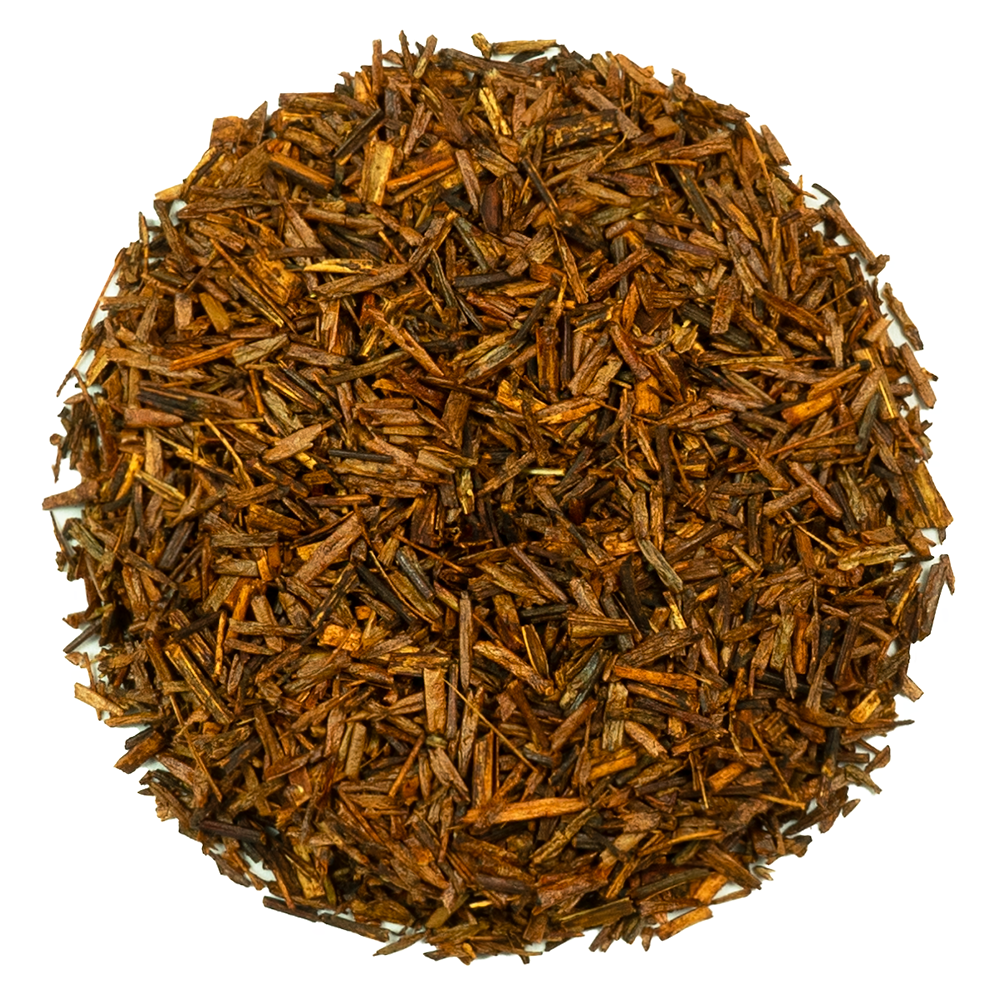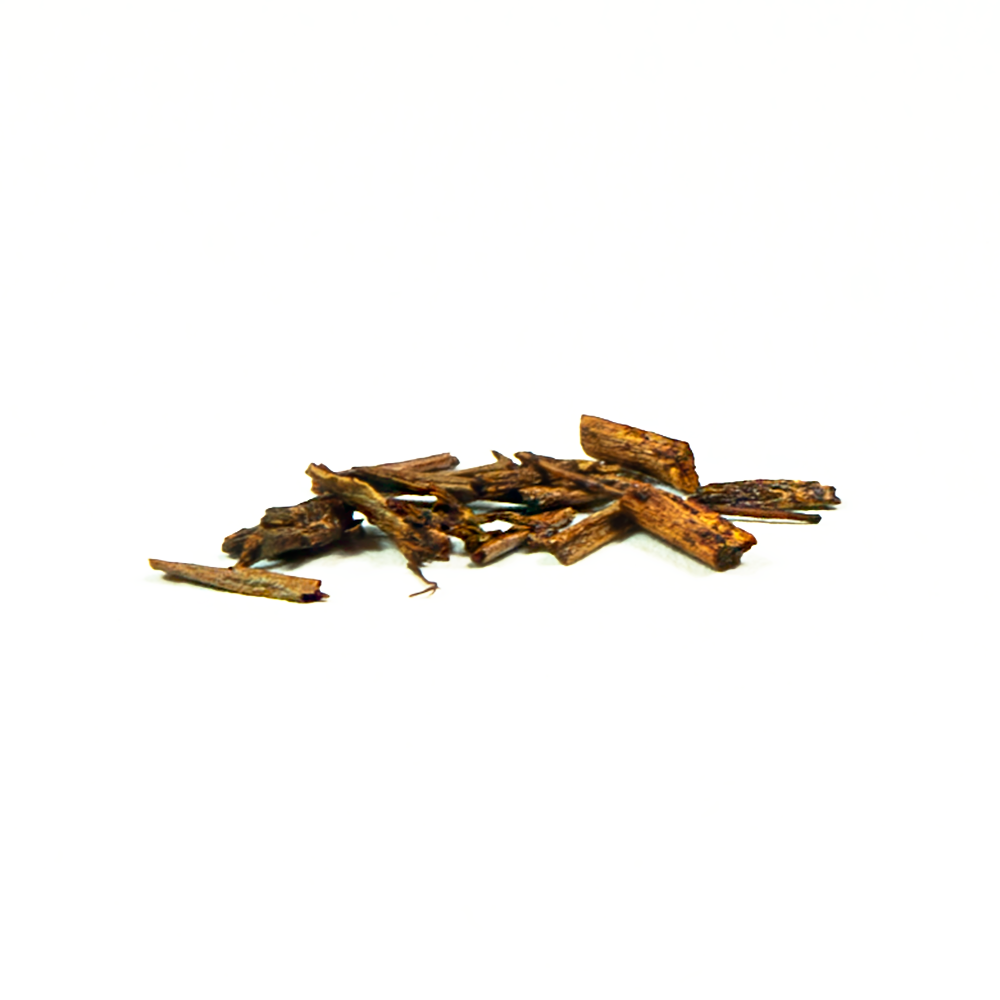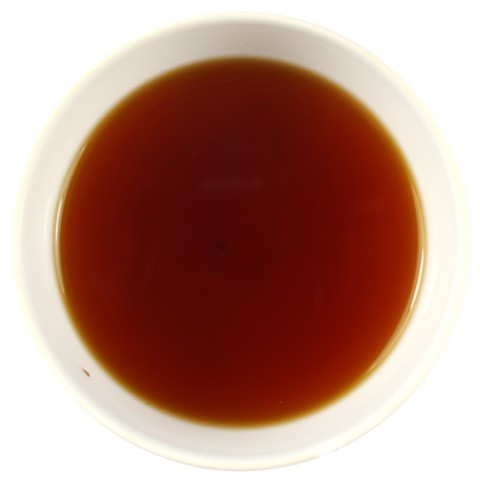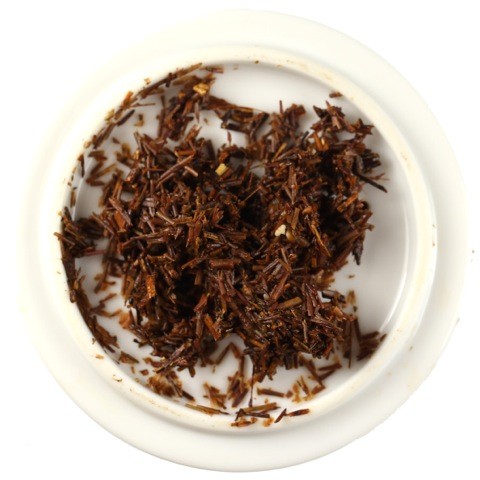Rooibos Tea Brewing Guide

1 Teaspoon
Add 1 teaspoon per person and one for the pot.

95⁰c - 100⁰c
Boil using fresh water, at a temperature of 95⁰ - 100⁰c.

5 - 7 Mins
Steep for 5-7 minutes, depending on personal preference.
About Product
-
Product Description
You’ve chosen the best Organic Rooibos Tea. This is a type of South African Herbal Tea made only with bio-cultivation methods. When brewed, it provides a gentle sweetness with notes of honey, nuts and caramel. Those wondering where to buy Organic Rooibos Tea needn’t look any further than here. The Kent and Sussex Tea and Coffee Company packs it fresh to order to ensure its quality and consistency.
Is Rooibos Tea Organic?
Rooibos (Aspalathus linearis) grows exclusively in the Cederberg Region of the Western Cape Province in South Africa. Often pronounced “roy-boss”, its other names include Red Bush Tea, Bush Tea and Red Tea. There are two varieties: Green Rooibos, which undergoes minimal processing, and Red Rooibos, which producers create by oxidising the leaves. But is Rooibos Tea organic?
This term refers to an agricultural product cultivated without pesticides, insecticides, bio-engineered genes or petroleum and sewage-based fertilisers. The good news is that the infusion you’ve decided upon here meets that high standard. The result is that it protects the environmental state of land in and around estates while ensuring the welfare of workers and promoting biodiversity.
Does Organic Rooibos Tea Have Caffeine?
The stimulating chemical compound known as caffeine exists in around sixty plants. Among them, of course, are “real” Tea (Camellia sinensis) and Coffee (Coffea). However, Rooibos and its close relative, Honeybush Tea, do not belong to the caffeinated family. These beverages are, therefore, 100% free of the constituent and so are excellent choices if you’re hoping to cut down your intake.
How to Make Organic Rooibos Tea
- Put Loose Leaf Organic Rooibos Tea into a Tea Infuser or Filter.
- Place the Tea-filled accessory in a cup or mug.
- Pour freshly boiled water at 100°C over the leaves.
- Allow it to steep for 5-10 minutes.
How to Serve: Consider honey or lemon. Alternatively, serve without additions.
Tasting Notes: Imparts a gentle sweetness with notes of honey, nuts and caramel.
Organic Rooibos Tea Benefits
It turns out that Organic Rooibos Tea benefits your health as much as it supports mother nature. The primary reason is its wealth in vitamins, minerals and other antioxidants such as Aspalathin, Calcium, Copper, Iron, Magnesium, Manganese, Potassium, Quercetin and Zinc.
These nutrients combined work on a molecular level to improve your well-being in a vast multitude of ways.
Organic Rooibos Tea for Digestion
Rooibos boasts remarkable antispasmodic properties that relieve indigestion, cramps and other stomach issues. The evidence comes from a study published in the Journal of Basic & Clinical Pharmacology & Toxicology, which established that quercetin helped relax the gastrointestinal system. Furthermore, it appeared to ease feelings of discomfort before, during and after a large meal.
Organic Rooibos Tea to Lower Cholesterol
The latest scientific research likewise indicates that the Herbal Tea can improve overall cholesterol levels. In one 2011 study published in the Journal of Ethnopharmacology, 40 overweight individuals at risk from heart disease consumed six cups of Rooibos daily for six weeks. The conclusion was that it decreased “bad” LDL cholesterol and boosted “good” HDL cholesterol in volunteers.
Organic Rooibos Tea During Pregnancy
Doctors, nurses, midwives and other medical professionals tend to urge caution when drinking Herbal Tea while pregnant. But there are exceptions to the rule, from Raspberry Leaf Tea during the third trimester to Ginger Root for reducing nausea. Are there concerns about Organic Rooibos Tea’s side effects on expecting mothers? The consensus is that it is safe in moderation, so feel free to put the kettle on.
Organic Rooibos Tea for Babies
In 1968, a South African mother named Annique Theron discovered one of the most famous of all Organic Rooibos Tea benefits. She realised that the Tea could relieve colic in her 18-month-old daughter due to it reducing symptoms of allergies. Much of the same is true today, although we’d recommend seeking medical consultation before trying it with your own baby as there remains an element of risk.
-
Delivery Information
We offer reliable delivery services through Royal Mail to ensure that your orders reach you on time.
Here are the main points you should be aware of:
- Standard UK Delivery: £3.95 excluding delivery charge.
- Delivery Times: Orders are processed and dispatched within 2-5 working days but they may take longer during busy times. It is worth noting that all our orders are packed by hand in order to maintain the quality.
- Free Delivery: We are delighted to provide free shipping for UK orders over £35*. Moreover, customers from Europe can enjoy free shipping for any purchase above €75*. Furthermore, we offer free delivery in the USA for all purchases exceeding $125*. Please note terms and conditions may apply.
- Tracking: When your package is sent you will receive a tracking number via email so as to keep tabs of its progress.
International Shipping
We do ship worldwide meaning our products can be accessed by anyone around the world.
Here are some important details:
- Delivery Times: International deliveries vary based on destination, generally taking between 7-14 working days.
- Shipping Costs: International shipping costs are calculated at checkout based on your location and weight of your order. View full delivery charges for your location.
- Customs and Import Duties: Remember customs or import duties may exist depending on regulations in your country; these charges are borne by the customer.
Returns Policy
Your satisfaction is our top priority, however if for any reasons you’re not completely happy with your purchase, simply follow our returns procedure:
- Eligibility: Items returned within 30 days of receipt must remain unopened and in their original condition.
- Process: In order to return an item contact our customer service department using your unique order number after which detailed instructions will be given concerning returning them back to us securely.
- Refunds: Our aim is to refund you within 5-7 working days upon successful reception of returned goods. The refund amount will be credited to your original payment method.
For any other Enquiries or help please contact our Customer Support Team always at your service.
-
Product Reviews

 Loose Leaf Tea
Loose Leaf Tea Pyramids
Pyramids Tea Bags
Tea Bags Africa
Africa Assam
Assam Ceylon
Ceylon Chinese
Chinese Darjeeling
Darjeeling European
European Indian
Indian Japan
Japan Nepal
Nepal South East Asia
South East Asia Ayurveda Tea
Ayurveda Tea Black Tea
Black Tea Chai Tea
Chai Tea Flowering Tea
Flowering Tea Fruit Tisanes
Fruit Tisanes Green Tea
Green Tea Herbal Tea
Herbal Tea Matcha Tea
Matcha Tea Oolong Tea
Oolong Tea Organic Tea
Organic Tea Pu erh Tea
Pu erh Tea Rooibos Tea
Rooibos Tea White Tea
White Tea Asian Coffee
Asian Coffee Caribbean Coffee
Caribbean Coffee Central American Coffee
Central American Coffee South American Coffee
South American Coffee Coffee Blends
Coffee Blends Decaffeinated Coffee
Decaffeinated Coffee Espresso Coffee
Espresso Coffee Ethically Sourced Coffee
Ethically Sourced Coffee Flavoured Coffee
Flavoured Coffee Organic Coffee
Organic Coffee Single Origin Coffee
Single Origin Coffee Chocolate 1
Chocolate 1 Chocolate 2
Chocolate 2 Chocolate 3
Chocolate 3 Chocolate 4
Chocolate 4 Chocolate 5
Chocolate 5 Chocolate 6
Chocolate 6 Chocolate 7
Chocolate 7 Chocolate 8
Chocolate 8 Chocolate 9
Chocolate 9 Loose Tea Filters
Loose Tea Filters Tea Accessories
Tea Accessories Tea Bricks
Tea Bricks Tea Caddies
Tea Caddies Tea Caddy Spoons
Tea Caddy Spoons Tea Gift Ideas
Tea Gift Ideas Tea Infusers
Tea Infusers Tea Strainers
Tea Strainers





